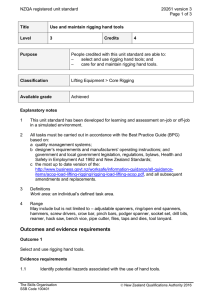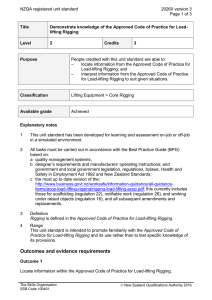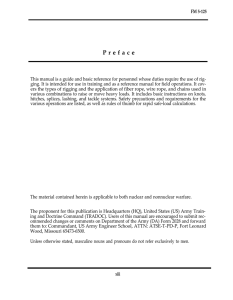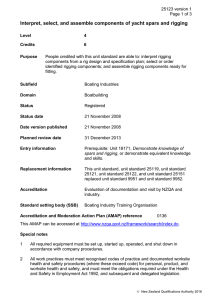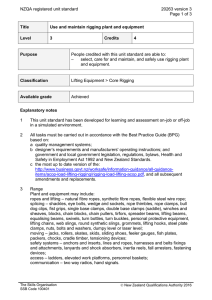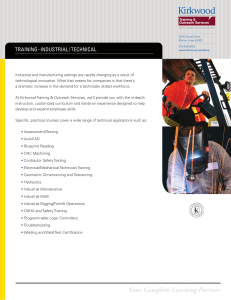NZQA registered unit standard 26352 version 2 Page 1 of 4
advertisement
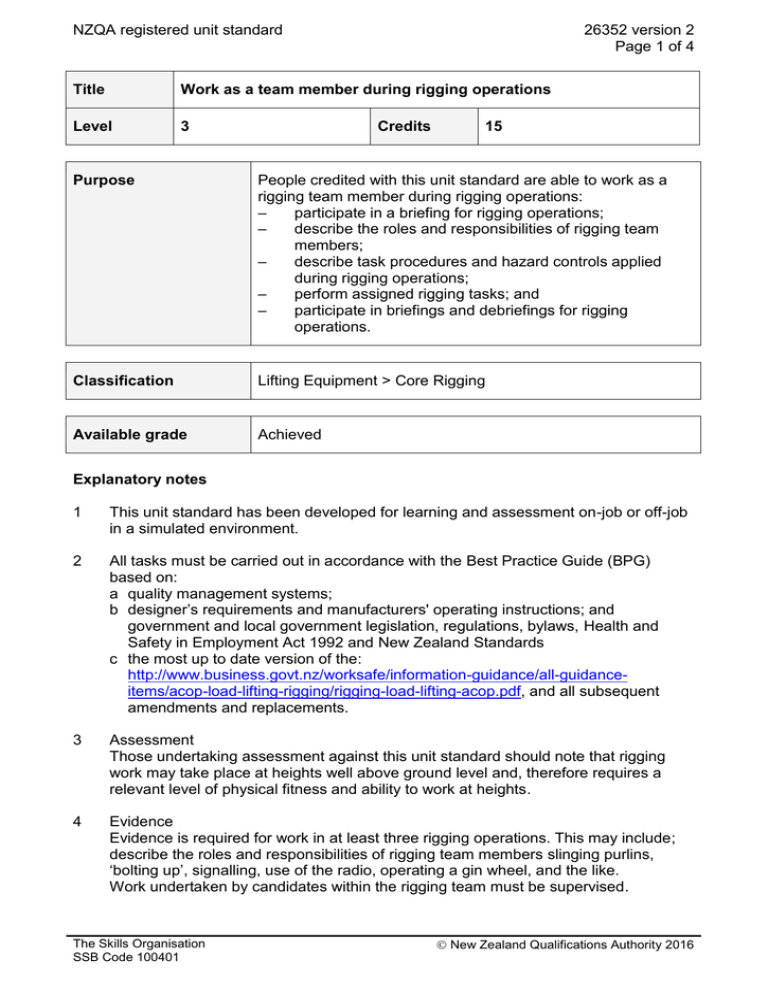
NZQA registered unit standard 26352 version 2 Page 1 of 4 Title Work as a team member during rigging operations Level 3 Credits 15 Purpose People credited with this unit standard are able to work as a rigging team member during rigging operations: – participate in a briefing for rigging operations; – describe the roles and responsibilities of rigging team members; – describe task procedures and hazard controls applied during rigging operations; – perform assigned rigging tasks; and – participate in briefings and debriefings for rigging operations. Classification Lifting Equipment > Core Rigging Available grade Achieved Explanatory notes 1 This unit standard has been developed for learning and assessment on-job or off-job in a simulated environment. 2 All tasks must be carried out in accordance with the Best Practice Guide (BPG) based on: a quality management systems; b designer’s requirements and manufacturers' operating instructions; and government and local government legislation, regulations, bylaws, Health and Safety in Employment Act 1992 and New Zealand Standards c the most up to date version of the: http://www.business.govt.nz/worksafe/information-guidance/all-guidanceitems/acop-load-lifting-rigging/rigging-load-lifting-acop.pdf, and all subsequent amendments and replacements. 3 Assessment Those undertaking assessment against this unit standard should note that rigging work may take place at heights well above ground level and, therefore requires a relevant level of physical fitness and ability to work at heights. 4 Evidence Evidence is required for work in at least three rigging operations. This may include; describe the roles and responsibilities of rigging team members slinging purlins, ‘bolting up’, signalling, use of the radio, operating a gin wheel, and the like. Work undertaken by candidates within the rigging team must be supervised. The Skills Organisation SSB Code 100401 New Zealand Qualifications Authority 2016 NZQA registered unit standard 26352 version 2 Page 2 of 4 Outcomes and evidence requirements Outcome 1 Participate in a briefing for rigging operations; Evidence requirements 1.1 Respond to briefing leader questions. Range 1.2 may include but is not limited to – key information on planned actions, assigned tasks; evidence of one rigging operation is required. Describe key information and logistics of the job task. Range may include but is not limited to – timing, location, major task objectives, key items of rigging equipment, transport. evidence of five the job tasks is required. Outcome 2 Describe the roles and responsibilities of rigging team members. Evidence requirements 2.1 Describe team members’ roles. Range 2.2 team leader, all other team members, own role; evidence of three roles are required. Describe team members’ responsibilities. Range team leader, all other team members, own responsibilities; evidence of three responsibilities are required. Outcome 3 Describe task procedures and hazard controls applied during rigging operations. Evidence requirements 3.1 Describe task procedures in accordance with supervisor’s instructions. Range The Skills Organisation SSB Code 100401 may include but is not limited to – site access, approvals to work, key contacts, sequence of rigging activities. New Zealand Qualifications Authority 2016 NZQA registered unit standard 26352 version 2 Page 3 of 4 3.2 Identify hazards prior to work commencing. 3.3 Describe hazard controls. Range 3.4 pre-identified hazards may include but are not limited to – potential for falls, cranes, moving plant, other people in the area; controls may include but are not limited to – safe work areas, signage, taped off areas. Describe personal protective equipment requirements. Range may include but is not limited to – gloves, hard hat, safety glasses, hearing protection, safety harness. Outcome 4 Perform assigned rigging tasks. Evidence requirements 4.1 Perform assigned rigging as directed by the team leader or supervisor. 4.2 Use personal protective equipment. Range may include but is not limited to – gloves, hard hat, safety glasses, hearing protection, safety harness; evidence of three personal protective equipment are required. Outcome 5 Participate in a debriefing for rigging operations. Evidence requirements 5.1 Respond to briefing leader questions. Range 5.2 may include but is not limited to – key information on team or personal actions, problems encountered. Give feedback on own performance during the task. Range Planned review date The Skills Organisation SSB Code 100401 may include but is not limited to – team objectives achieved, hazard controls, personal role, challenges faced. 31 December 2019 New Zealand Qualifications Authority 2016 NZQA registered unit standard 26352 version 2 Page 4 of 4 Status information and last date for assessment for superseded versions Process Version Date Last Date for Assessment Registration 1 22 October 2010 31 December 2016 Review 2 16 July 2015 N/A Accreditation and Moderation Action Plan (AMAP) reference 0003 This AMAP can be accessed at http://www.nzqa.govt.nz/framework/search/index.do. Please note Providers must be granted consent to assess against standards (accredited) by NZQA, or an inter-institutional body with delegated authority for quality assurance, before they can report credits from assessment against unit standards or deliver courses of study leading to that assessment. Industry Training Organisations must be granted consent to assess against standards by NZQA before they can register credits from assessment against unit standards. Providers and Industry Training Organisations, which have been granted consent and which are assessing against unit standards must engage with the moderation system that applies to those standards. Consent requirements and an outline of the moderation system that applies to this standard are outlined in the Accreditation and Moderation Action Plan (AMAP). The AMAP also includes useful information about special requirements for organisations wishing to develop education and training programmes, such as minimum qualifications for tutors and assessors, and special resource requirements. Comments on this unit standard Please contact The Skills Organisation at reviewcomments@skills.org.nz if you wish to suggest changes to the content of this unit standard. The Skills Organisation SSB Code 100401 New Zealand Qualifications Authority 2016
